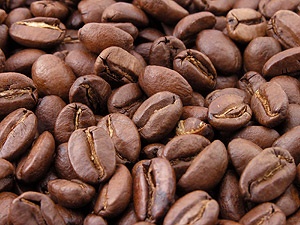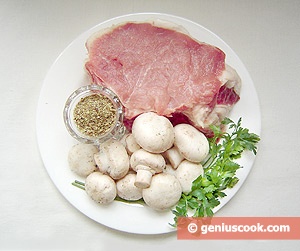Coffee
 The first coffee beans came from Ethiopia, and more precisely from highlands of Caffa region in the southwestern part of modern Ethiopia (coffee sounds like “qahwa” in Arabic). The earliest coffee beverage was made by soaking whole coffee beans in water. Afterwards, coffee beans were roasted over an open fire and boiled for thirty minutes which resulted in a straw-yellow brew. In the thirteenth century, coffee beans were first left to dry in the sun. Dried beans can be stored longer and the beverage made from them is much nicer. Later, the process was completed with the roasting of dried beans over coal embers. Coffee beans are roasted at the temperature of 200-220 C (360-396 F). During the roasting process, cellulose is lost and the niacin content increases, which eventually brings about a better flavor and increased nutritional values.
The first coffee beans came from Ethiopia, and more precisely from highlands of Caffa region in the southwestern part of modern Ethiopia (coffee sounds like “qahwa” in Arabic). The earliest coffee beverage was made by soaking whole coffee beans in water. Afterwards, coffee beans were roasted over an open fire and boiled for thirty minutes which resulted in a straw-yellow brew. In the thirteenth century, coffee beans were first left to dry in the sun. Dried beans can be stored longer and the beverage made from them is much nicer. Later, the process was completed with the roasting of dried beans over coal embers. Coffee beans are roasted at the temperature of 200-220 C (360-396 F). During the roasting process, cellulose is lost and the niacin content increases, which eventually brings about a better flavor and increased nutritional values.
History of Coffee
In 1819, French scientist Runge successfully separated colorless silky crystals with slightly bitter taste from coffee extract. Aqueous solution of these crystals significantly excelled coffee brew in stimulant action. That substance, which is related to alkaloids, was named caffeine. Coffee was born a second time as a medical remedy after the discovery of caffeine that is now widely used in medical practice against many diseases. Caffeine is a part of more than twenty different drugs that help to improve impaired organ function.
Caffeine’s Effects on Our Body
Caffeine’s effects (as well as other psychoactive drugs) essentially depend on the type of higher nervous activity, thus, individual differences in nervous system should be considered for proper dosing. Caffeine reduces the effects of soporifics and narcotics, increases reflex excitability of spinal cord and stimulates respiratory and vasomotor centers. Cardiac function increases under the influence of caffeine and cardiac muscle contractions get more intensive and frequent. If you have a normal blood pressure, there won’t be any substantial effects since caffeine stimulates not only vasomotor center and cardiac muscle, but also expands blood vessels of skeletal muscles and of some other organs (like brain, heart and kidneys), yet it contracts blood vessels in abdominal organs, expect kidneys. Caffeine action also leads to the increase in diuresis slightly. Caffeine stimulates secretion of stomach.
Coffee and Hypertension
Years of medical observations show, that the consumption of coffee slightly increases blood pressure, which appears to have a minor role in the development of hypertension. Numerous studies supported the idea, that coffee does not contribute to hypertension.
Is Coffee Unhealthy?
Over the years there was a prevailing view, that coffee can cause pancreatic cancer as well as rectal and colon cancer. However, recent biochemical studies denied that argument. Conversely, coffee derivatives have anticarcinogenic properties and reduce the activity of some cancer-causing agents due to the increased antioxidant protection and suppression of carcinogens. The conclusions of biochemists are justified by large-scale epidemiological researches.
Useful Properties of Coffee
A study found, that people who drink coffee are less exposed to risk of suicide, than those who don’t. Increased coffee doses resulted in even less risk. Findings say, that caffeine increases concentration and simplifies the performance of cognitive tasks involving complex approach and decision making.
In sum, coffee:
- affects lung function,
- improves blood supply,
- contains vitamin PP and minerals,
- stimulates kidney function,
- has a positive effect on hypertensive patients,
- boosts endurance,
- helps to subdue sleepiness,
- enhance memory and the ability to concentrate,
- promotes creativity and associative thinking,
- cures common cold (at early stage), especially coffee with a few drops of cognac,
- gets you feel better.
So, stay healthy with coffee.







